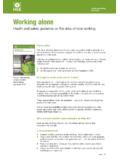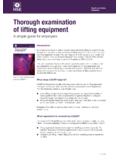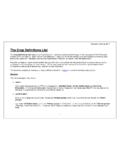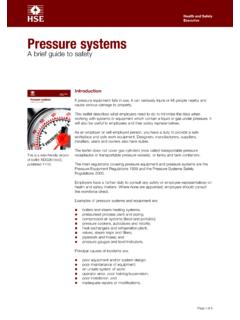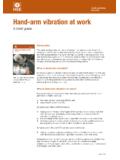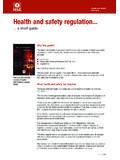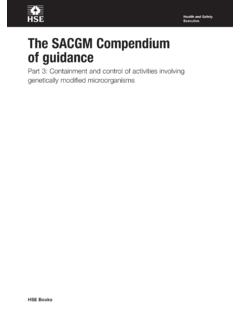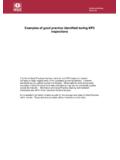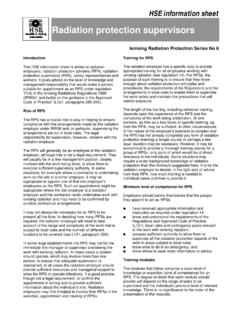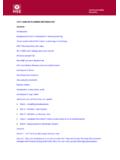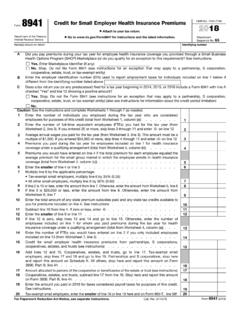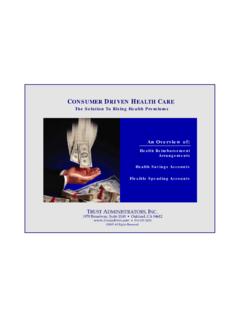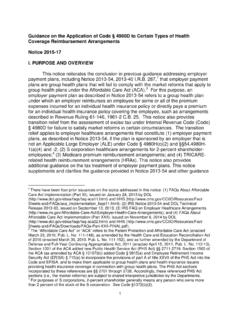Transcription of Costs to Britain of new cases of workplace fatalities …
1 health and Safety Executive Costs to Britain of workplace fatalities and self-reported injuries and ill health , 2015/16. Contents Summary 2. Introduction 3. Method and data 5. General approach 5. Cost components 5. Cost bearers 6. Accounting for uncertainty' in the cost model 7. Number of workplace injury and work-related ill health cases 8. Number of workplace injury cases 8. Number of new cases of work-related ill health 9. Time off work resulting from workplace injury or work-related ill health 10. Never Returns' 10. Results 11. Total Costs 11. Cost by cost bearer 11. Costs by cost component 12. Costs by type of incident 13.
2 Costs by Industry and Region 15. Changes in cost estimates over time 17. Appraisal values, or Unit Costs ' 18. Annexes 19. Annex 1: Costing framework: A description of the different cost components by cost bearer 19. Annex 2: Detailed breakdown of Costs by cost bearer in 2015/16 (2015 prices) 23. Annex 3: Glossary of economic terms and concepts 25. Links 26. This document is available from Page 1 of 26. Summary Each year, significant numbers of workers are injured or made ill by their work. These cases impose human'. Costs (in terms of the impact on the individual's quality of life and, for fatal injuries, loss of life), as well as the financial' Costs , such as loss of production due to absence from work, and healthcare Costs .
3 The total Costs of workplace injuries and ill health includes both the financial Costs and a valuation of the human Costs . Latest estimates show that annually between 2014/15 and 2016/17 an average of 614,000 workers were injured in workplace accidents and a further 521,000 workers suffered a new case of ill health which they 1. believe to be caused or made worse by their work. The estimated Costs to Britain of these cases Total Costs showed a downward trend between 2004/05 and 2009/10; this fall was driven by a reduction in the number of workplace injuries. Since then, total annual Costs have been broadly level.
4 Lower than 2004/05. (Injury Costs 35% lower than 2004/05; change in ill health Costs not statistically significant). Broadly level since 2009/10. Source: HSE Costs to Britain Model These Costs provide a good representation of the Costs of ill health and injury arising from current working 2. conditions. The majority of Costs fall on individuals, while employers and government/taxpayers bear a similar proportion of the remaining Costs of workplace injury and ill health . Source: HSE Costs to Britain Model 1. Source: Labour Force Survey(non-fatal injuries) and RIDDOR (fatal injuries), annual average estimate 2014/15- 2016/17.
5 2. Restricting the estimate of ill health cases to self-reports of newly occurring ill health allows us to best capture those cases arising from current working conditions. HSE has recently published research which estimates the Costs of new cases of work-related cancer arising from past working conditions. Available at: This document is available from Page 2 of 26. Introduction This report presents latest estimates of the Costs to Britain of workplace injuries and ill health resulting from current day working conditions. Each year, significant numbers of workers are injured or made ill by their work. These cases impose human'.
6 Costs (in terms of the impact on the individual's quality of life and for fatal injuries, loss of life), as well as the financial' Costs , such as loss of production due to absence from work, and healthcare Costs . Estimating the total economic Costs of workplace injuries and ill- health by accounting for these impacts allows us to: estimate the overall scale of health and safety failings, taking into account the impacts that fall on different groups (individuals, employers and government/taxpayers);. provide a high-level indicator of movements in the performance of the health and safety system;. provide unit Costs (or appraisal values') for cases of workplace injuries and work-related ill health for use in regulatory impact assessments and other economic appraisals.
7 This allows us to compare the Costs , in monetary terms, of workplace injury and ill health with other Costs and benefits associated with an 3. intervention policy. Since these Costs to Britain ' estimates aim to reflect the Costs of workplace ill health and injury occurring today arising from current working conditions, they do not include Costs of ill health cases occurring in the current year caused by historical working conditions. In particular, this excludes long latency work-related ill health such as cancer, since, by and large, these cases will result from past working 4. conditions. Figure 1 (next page) shows the injury and ill health cases that are included in the Costs to Britain estimate.
8 3. It is important to note that the cost estimates presented in this report do not include the Costs associated with implementing measures to improve health and safety standards and complying with health and safety regulations. 4. HSE has recently published research which estimates the Costs of new cases of work-related cancer arising from past working conditions. Available at: This document is available from Page 3 of 26. Figure 1: workplace injury and ill health cases included in Costs to Britain '. Past Present Future Past Current Working Working conditions conditions New cases New cases New cases New cases long latency workplace short latency long latency work related injury work related work related ill health ill health ill health cases occurring today due to cases occurring in past working conditions are not cases occurring today the future due to included in Costs to Britain due to current working current working conditions are included conditions not HSE has published an in Costs to Britain included in Costs to estimate of the Costs of one Britain such category of occupational ill health .
9 The Cost of Work-related Cancer in 2010, caused by past Definition: latency is the period between working conditions. exposure to the harmful hazard ( chemical). [ and onset of symptoms. For some ill health h/ ] conditions cancers, the latency period is quite long (decades for some cancers) while for other conditions stress, the latency period is relatively short. Note: boxes outlined with a dashed line indicate cases of workplace injury and work-related ill health included in the Costs to Britain ' estimates. This document is available from Page 4 of 26. Method and data General approach The general principle for estimating Costs is to apply the formula: Cost = Quantity x Unit price where quantity' is the number of workplace injury or ill health cases , by severity category, and unit price' is the appropriate monetary value per case for each impact accounted for in the model.
10 Costs are estimated 5. separately using this basic formula and grouped into the different cost components summarised below. Information on the number of workplace injury and ill health cases ( quantity') is taken from two sources: statutory reports under the Reporting of Injuries, Diseases and Dangerous Occurrences Regulations 6. (RIDDOR) for estimates of fatal injuries; and survey estimates from the Labour Force Survey of self-reports of non-fatal injury and new cases of work-related ill health . This data is discussed in more detail in the section Number of workplace injury and work-related ill health cases '.
